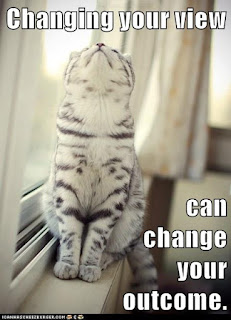Feedback Strategies: Presence Over Praise
 |
| A growth mindset cat. Courtesy of Laura Gibbs. Source: Growth Mindset Resources. |
As someone who's very oriented around both giving and receiving praise, these articles were very helpful to me. I love encouraging and praising others, but it's helpful to think about being constructive and being present when I do so, per these articles:
Presence, Not Praise: How to Cultivate a Healthy Relationship with Achievement
From personal experience, as someone who's always been touted as "naturally creative" or "naturally smart," it's harmful to both sides to assume that these gifts are innate and not built by hard work and application. Those who aren't "born with it" may never try to develop skills they think they have no hope of learning, and those who are "born with it" will feel disappointed in themselves and like failures when their talents aren't quite enough. I also agree with this article's assertion that praising people's effort and praising them for doing things you know actually challenged them (Dweck's method) is far more productive than praising their natural ability or their completion of mundane tasks.
The Difference Between Praise and Feedback
I do see Kohn's point in this article, but I also think never giving any praise can be harmful (especially in the family situation he applies it to). I think Dweck's point about making sure you not only praise constructively, but engage people where they are/with what they're working on is crucial. Asking questions of people can show them that you're interested and even approving, and hopefully can help them self-reflect and become even better. Asking questions also means you as the critic have to be continuously engaged and be really present, so that method turns out best for everyone. Dweck is right — praise is easy for all of us. Engaging is far more difficult and rewarding.


Comments
Post a Comment